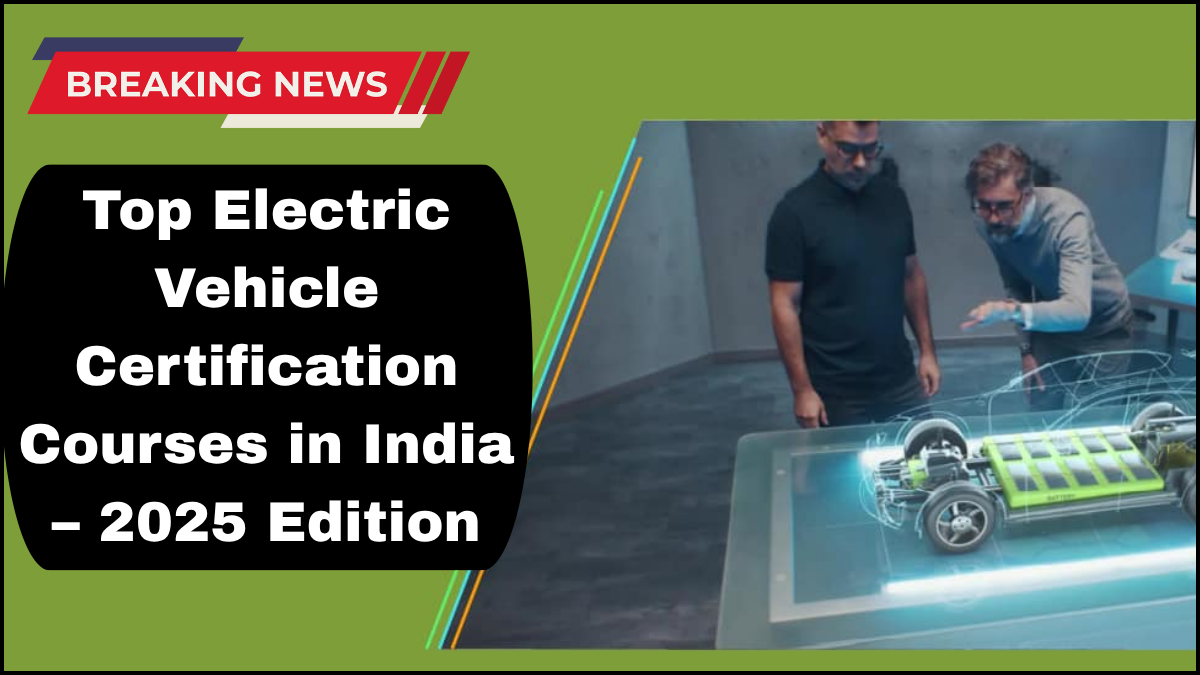With India rapidly transitioning to clean mobility, Electric Vehicles (EVs) are no longer a future concept—they’re the present. As the EV ecosystem expands, the demand for skilled professionals is rising sharply. For students, engineers, and auto enthusiasts looking to future-proof their careers, EV certification courses in India have become a critical stepping stone. These programs offer practical skills, technical knowledge, and industry-relevant exposure essential for entering this high-growth domain.
Here’s a deep dive into the top EV certification courses available in India in 2025, designed to guide you towards the right learning path in the evolving field of electric mobility.

1. NPTEL – Electric Vehicles by IIT Madras
Offered through the National Programme on Technology Enhanced Learning (NPTEL), this course by IIT Madras remains one of the most respected and accessible EV certification courses in India. It covers fundamental EV concepts including motor design, power electronics, battery management, and vehicle dynamics.
-
Duration: 12 weeks
-
Mode: Online (Free with optional paid certification)
-
Target Audience: Engineering students, working professionals, auto educators
What sets it apart is the academic rigor and detailed modules created by leading IIT professors. It’s ideal for learners looking to build a solid theoretical base.
2. ISIE India – Certified EV Engineer Program
Imperial Society of Innovative Engineers (ISIE) offers one of the most hands-on EV certification courses tailored for industry readiness. Their Certified EV Engineer program includes training in:
-
Battery pack design and testing
-
BMS (Battery Management System)
-
EV powertrain integration
-
Real-time simulations and live projects
-
Duration: 6–8 weeks
-
Mode: Hybrid (Online + In-person Labs)
-
Recognized by: Automotive Skill Development Council (ASDC)
This program is best for students and professionals who prefer a blend of classroom learning and practical exposure.
3. Skill-Lync – Post Graduate Program in Electric Vehicle Design and Development
Skill-Lync has quickly gained traction in the auto education space with advanced, career-focused learning. This PG certification covers full-stack EV engineering including:
-
Control systems
-
Embedded systems for EVs
-
Motor & inverter design
-
CAD and CAE simulations for EV systems
-
Duration: 12 months
-
Mode: Online (with dedicated project mentors)
-
Placement Support: Yes, with corporate partners like Tata Elxsi and Mahindra Electric
This is one of the most detailed EV certification courses in India and is highly recommended for serious career upskilling.
4. DIYguru – EV Nanodegree Program
Backed by partnerships with ARAI and ASDC, DIYguru’s nanodegree program is widely popular for its flexibility and certification recognition. The curriculum includes:
-
EV fundamentals
-
EV architecture and drivetrain
-
Battery technology and thermal management
-
Hands-on Arduino and MATLAB projects
-
Duration: 6 months
-
Mode: Fully Online
-
Certifications: ASDC & Automotive Skill Council accredited
Ideal for beginners and working professionals who need a self-paced structure without compromising on industry relevance.
5. SAE India – Professional Development Programs in Electric Mobility
SAE India offers specialized workshops and certificate programs designed for automotive engineers and R&D professionals. Their training includes:
-
EV standardization & regulatory framework
-
Power electronics and motor controller design
-
Charging infrastructure and interoperability
-
Duration: Varies (Typically 1–3 months)
-
Mode: Offline and Online
-
Who it’s for: Mid-career engineers and auto sector employees
SAE’s certification holds high value in the Indian automotive industry and supports continuing professional development.
6. ARAI Academy – EV Technology and Applications Course
The Automotive Research Association of India (ARAI) is a nodal agency for EV testing and certification in India. Its EV certification course includes:
-
EV regulations and compliance
-
Vehicle and component level validation
-
Charging standards and grid integration
-
System-level design and diagnostics
-
Duration: 4–6 weeks
-
Mode: In-person and online blended
-
Industry Access: Strong ties with OEMs and Tier 1 suppliers
Perfect for professionals involved in EV compliance, design validation, and homologation.
Why Choose EV Certification Courses in India?
India’s auto education landscape is evolving to match the electrification drive. EV certification programs offer a structured path to enter this growing market, whether you’re a fresher or an industry veteran. Benefits include:
-
Industry-relevant skills: From battery tech to system diagnostics
-
Practical exposure: Internships, labs, and real-time projects
-
Career mobility: Access to roles in OEMs, startups, and R&D labs
-
Government-backed recognition: Certifications from ASDC, ARAI, and NPTEL add credibility
As the nation pushes for 30% EV adoption by 2030, the opportunity is massive—and these courses are the gateway.
FAQs on EV Certification Courses in India
Q1. Who should enroll in EV certification courses?
Anyone from engineering students, diploma holders, working professionals in the auto sector, to entrepreneurs can benefit. Courses cater to beginners as well as experienced engineers.
Q2. Are online EV courses as valuable as offline ones?
Yes—many online programs now offer virtual labs, project-based learning, and real-time mentoring. Certifications from reputed platforms like NPTEL, Skill-Lync, and DIYguru are well-recognized.
Q3. Do these certifications help with job placement?
Many courses offer placement assistance, internships, and connect learners to EV startups, OEMs, and Tier-1 suppliers. Skill-Lync and ISIE India are particularly strong in placement support.
Q4. How much do EV certification courses cost in India?
Costs vary widely—from free NPTEL courses to INR 1.5–2 lakhs for advanced PG programs. Choose based on your learning goals and budget.
Q5. What’s the scope of EV jobs in India?
India’s EV industry is booming, with high demand in battery design, EV software, power electronics, and charging infrastructure. Skilled professionals are in short supply, making certified candidates highly valuable.
click here to learn more